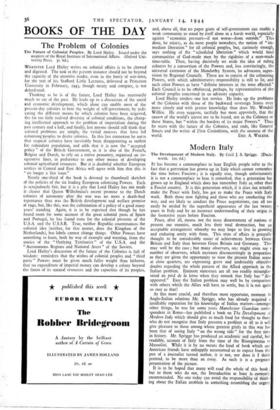BOOKS OF THE DAY
The Problem of Colonies
The Future of Colonial Peoples. By Lord Halley. Issued under the auspices of the Royal Institute of International Affairs. (Oxford Uni- versity Press. 3s. 6d.)
WHATEVER Lord Halley writes on colonial affairs is to be chewed and digested. The task in the present instance should not be beyond the capacity of the attentive reader, even in the hurry of war-time, for the text of his Stafford Little Lectures, delivered at Princeton University in February, 1943, though meaty and compact, is not dehydrated.
Thinking as he is of the future, Lord Hailey has necessarily much to say of the past. He leads up to a discussion of the social and economic development, which alone can enable most of the present-day colonies to bear the weight of self-government, by indi- cating the different means by which colonies have been acquired, the far too little realised diversity of colonial conditions, the chang- ing intellectual approach to the problem of imperialism during the past century and a half, and finally, lest anyone should still think that colonial problems arc simple, the varied motives that have led colonising peoples to desire colonies. In this last connexion he notes that tropical colonies have inevitably been disappointing as outlets for redundant population, and adds that it is now the " accepted policy " of the British Government, as it is also of the French, Belgian and Dutch, to rely on a native peasantry, organised on co- operative lines, in preference to any other means of developing colonial agricultural resources. But it is doubtful whether European settlers in Central and East Africa wilt agree with him that this is " no longer a live issue."
Nearly one-third of the book is devoted to thumbnail sketches of the policies of the six leading European colonising Powers. Each is scrupulously fair, but it is a pity that Lord Hailey has not made it clearer that Queen Wilhelmina's recent promise to the Dutch colonies of autonomy after the war was no more a death-bed repentance than was the British development and welfare promise of israo, but, like this, was the culmination of a policy of a good many years' standing. Again, it is to be regretted that though he has • found room for some account of the great colonial pasts of Spain and Portugal, he has found none for the colonial presents of the U.S.A. and the U.S.S.R. True, neither Republic countenances the colonial idea (neither, for that matter, does the Kingdom of the Netherlands), but labels cannot change things. Other Powers have something to learn, both by way of example and warning, from the stories of the " Outlying Territories " of the U.S.A. and the "Autonomous Regions and National Areas" of the Soviets.
Lord Hailey's discussion of the future of the Colonies is full of wisdom : reminders that the wishes of colonial peoples and " third party " Powers must be given much fuller weight than hitherto, that no expenditure of imperial money can develop a colony beyond the limits of its natural resources and the capacities of its peoples, and, above all, that no paper grant of self-government can enable a weak community to stand by itself alone in a harsh world, especially against " economic pressure—if not worse—from outside."- This done, he rejects, as do most people nowadays, the notion of "im- mediate liberation " for all colonial peoples, but, curiously enough, says nothing of the " scheduled liberation " which would bind communities of God-made men by the rigidities of a man-made time-table. Then, having decisively set aside the idea of ruling colonies by .a consortium of the Powers and, less convincingly, the universal extension of the MandatOry System, he advocates, super- vision by Regional Councils. These are to consist of the colonising Powers, with which administrative responsibility is still to lie, and such other Powers as have " definite interests in the zone affected." Each Council is to be reinforced, perhaps, by representatives of the colonial peoples concerned in an advisory capacity, Lord Hailey renders one last service. He links up the problems of the Colonies with those of the backward sovereign States even more closely and with greater knowledge than does Mr.- Wendell Willkie. He even suggests, tactfully but most appositely, that the causes of the world's unrest are to be found, not in the Colonies or these States, but " within the borders of its major Powers." Thus he starts with the future of the Colonies, and ends, like General Smuts and the writer of First Corinthians, with the oneness of the


























 Previous page
Previous page